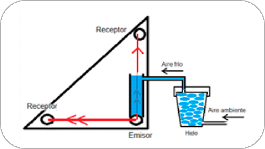Michelson and Morley's experiment in acoustic version, a university physics lab work based on inquiry learning

Downloads
- PDF (Español (España)) 582
- EPUB (Español (España)) 83
- VISOR (Español (España))
- MÓVIL (Español (España))
- XML (Español (España)) 79
DOI
https://doi.org/10.25267/Rev_Eureka_ensen_divulg_cienc.2023.v20.i1.1203Info
Abstract
This article reports a didactic experience in the university classroom within the framework of inquiry-based learning in the physics laboratory. The students generated new questions and hypotheses based on an already built experimental design: an acoustic ultrasound interferometer.To illustrate, two groups of students posed questions and hypotheses concerning the device and modified its original design. This work aspires to show the theoretical and methodological resources employed to develop an experimental wave physics class, making use of available material as well as training in competencies that are the makeing of future teachers or graduates in physical sciences.
Keywords
Downloads
Supporting Agencies
How to Cite
License
Copyright (c) 2022 Luis Jaime Bernal, Roberto Mariano Insabella, Jorge Nicolás López, Gabriel Horacio Pérez, Pablo Alejandro Sánchez, Horacio Tesolin, Esteban Guillermo Szigety

This work is licensed under a Creative Commons Attribution-NonCommercial-NoDerivatives 4.0 International License.
Require authors to agree to Copyright Notice as part of the submission process. This allow the / o authors / is non-commercial use of the work, including the right to place it in an open access archive. In addition, Creative Commons is available on flexible copyright licenses (Creative Commons).

Reconocimiento-NoComercial
CC BY-NC
References
Acevedo Díaz J. A., Vázquez Alonso Á., Manassero-Mas M. A., Acevedo-Romero P. (2007) Consensos sobre la naturaleza de la ciencia: fundamentos de una investigación empírica. Revista Eureka sobre Enseñanza y Divulgación de las Ciencias 4(1), 42-66.
Aduriz Bravo A. (2017) Pensar la enseñanza de la física en términos de “competencias”. Revista de Enseñanza de la Física 29(2), 21-31.
Allchin D. (2011) Evaluating knowledge of the nature of (whole) science. Science Education 95(3), 518-542.
Almerich G., Díaz-García I., Cebrián-Cifuentes S., Suárez-Rodríguez J. (2018) Estructura dimensional de las competencias del siglo XXI en alumnado universitario de educación. Relieve 24(1), 1-21.
Bernal L., Insabella M., Ridao S., Schipani F., Cascallares G., Szigety E. (2017) Un experimento introductorio a la teoría de la relatividad: el interferómetro de Michelson acústico. Revista de Enseñanza de la Física 29, 461-471.
Brown T. J., Kuratko D. F. (2015) The impact of design and innovation on the future of education. Psychology of Aesthetics, Creativity, and the Arts 9(2), 147.
Budnyk O., Protas O., Voloshchuk H., Berezovska L., Rusakova O. (2021) Current challenges in the conditions of distance education: Inquiry based learning. Revista Inclusiones 210-222.
Caamaño A. (2004) Experiencias, experimentos ilustrativos, ejercicios prácticos e investigaciones: una clasificación útil de los trabajos prácticos. Alambique 39(8), 19.
Chinn C. A., Malhotra B. A. (2002) Epistemologically authentic inquiry in schools: A theoretical framework for evaluating inquiry tasks. Science Education 86(2), 175-218.
CONFEDI (2006) “Primer acuerdo sobre competencias genéricas. 3er. Taller sobre desarrollo de competencias en la enseñanza de la ingeniería argentina” – Experiencia Piloto en las terminales de Ing. Civil, Electrónica, Industrial, Mecánica y Química”, Carlos Paz.
CONFEDI (2018) Propuesta de estándares de segunda generación para la acreditación de carreras de ingeniería en la República Argentina “Libro Rojo de CONFEDI”. Rosario, Argentina: CONFEDI.
Domin D. S. (1999) A review of laboratory instruction styles. Journal of chemical education 76(4), 543.
García-Carmona A. (2013) Educación científica y competencias docentes: Análisis de las reflexiones de futuros profesores de Física y Química. Revista Eureka sobre enseñanza y divulgación de las ciencias 10, 552-567.
Gil Pérez D., Valdés Castro P. (1996) La orientación de las prácticas de laboratorio como investigación: un ejemplo ilustrativo. Enseñanza de las Ciencias 14(2), 155-163.
Hodson D. (1994). Hacia un enfoque más crítico del trabajo de laboratorio. Enseñanza de las Ciencias 12(3), 299-313.
Hofstein A., Lunetta V. N. (1982) The role of the laboratory in science teaching: Neglected aspects of research. Review of educational research 52(2), 201-217.
Kundt A. (1868) III. Acoustic experiments. The London, Edinburgh, and Dublin Philosophical Magazine and Journal of Science 35(234), 41-48.
Le Boterf G. (1998) Évaluer les compétences. Quels jugements? Quels critères? Quelles instances. Education permanente 135(2), 143-151.
Le Boterf G. (2002) De quel concept de compétence avons-nous besoin. Soins cadres 41, 1-3.
Madhuri G. V., Kantamreddi V. S. S. N., Prakash Goteti L. N. S. (2012) Promoting higher order thinking skills using inquiry-based learning. European Journal of Engineering Education 37(2), 117-123.
Michelson A. A., Morley E. W. (1887) On the relative motion of the earth and the luminiferous Ether. The American Jornal of Science 34(203), 333–343.
Pedaste M., Mäeots M., Leijen Ä., Sarapuu T. (2012) Improving students’ inquiry skills through reflection and self-regulation scaffolds. Technology, Instruction, Cognition and Learning 9(1-2), 81-95.
Pedaste M., Mäeots M., Siiman L. A., De Jong T., Van Riesen S. A., Kamp E. T., Manoli C. C., Zacharia Z. C., Tsourlidaki E. (2015) Phases of inquiry-based learning: Definitions and the inquiry cycle. Educational research review 14, 47-61.
Perrenoud P. (2008) Construir las competencias, ¿es darle la espalda a los saberes?. Revista de docencia universitaria 6(2).
Perrenoud P. (2009) Enfoque por competencias, ¿una respuesta al fracaso escolar?. Pedagogía social. Revista interuniversitaria 1(16), 45-64.
Petrucci D., Ure J., Salomone H. D. (2006) Cómo ven los trabajos prácticos de laboratorio de física los estudiantes universitarios. Revista de Enseñanza de la Física 19(1), 7-20.
Saraiva-Neves M., Caballero C., Moreira M. A. (2006) Repasando o papel do trabalho experimental, na aprendizagem da Física, em sala de aula. Um estudo exploratório. Investigações em Ensino de Ciências 11(3), 383-401.
Sujarittham T., Tanamatayarat J., Kittiravechote A. (2019) Investigating the Students' Experimental Design Ability toward Guided Inquiry Based Learning in the Physics Laboratory Course. Turkish Online Journal of Educational Technology-TOJET 18(1), 63-69.
Tan J. P. L., Koh E., Jonathan C., Yang S. (2017) Learner dashboards a double-edged sword? Students’ sense-making of a collaborative critical reading and learning analytics environment for fostering 21st-century literacies. Journal of Learning Analytics 4(1), 117-140.






